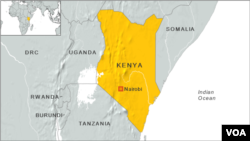Kenya’s government says it has been working around the clock to secure the country and fight against terrorism and other threats. For the last year, authorities have been implementing a new community policing initiative called ‘Nyumba Kumi’ as part of those efforts.
In the upscale Nairobi suburb of Runda, traffic moves at a snail’s pace and few people can be seen on foot. This is the neighborhood where, in December, Kenyan authorities arrested 76 Chinese nationals suspected of committing cyber-crimes.
But Kenyan security agencies only discovered the suspicious activity when one of the houses the Chinese were living in caught fire. The incident created uproar as to how the government could have missed such a potentially huge criminal threat in the heart of Nairobi. It is one in a long string of incidents where the government has been accused of intelligence failures.
Kenyan authorities say they have been working hard to improve security protocols and one thing is clear: the government can’t do it all alone. They say they need the cooperation of every Kenyan citizen in keeping the country safer.
And that is where the fairly new community policing initiative comes in - known as ‘Nyumba Kumi’ - which means “10 households”.
Nyumba Kumi organizes 10 households in each designated neighborhood to act as a community watch team - which then alerts police and security services to any activities they observe as unusual or suspicious.
Kenya adopted the initiative from neighboring Tanzania where it has reportedly achieved success.
But a number of Kenyans are skeptical about its usefulness in their communities.
Sammy Mwevu is a creative manager who lives in secured high end Nairobi neighborhood. He says he doesn’t want to know his neighbors and adds that knowing them won’t make any difference to his security.
"The place I live in we have a security personnel downstairs [at the gate]. So knowing my neighbor is totally none of my business. And it doesn’t make me feel any [more] secure knowing them. I don’t see it making any change," said Mwevu.
Others have concerns that this community watch potentially violates their civil rights.
Octavian Gakuru is a professor of sociology at the University of Nairobi.
“It’s evident that this country has reached a point of social development and change, where individualism is quite pronounced and privacy is now one of the highly treasured social values in this society" said Gakuru.
But professor Gakuru doesn’t write off the program as necessarily ineffective. He says it depends on where it is implemented.
“They are areas where community policing initiative can work. But they are areas where this initiative may quite not work easily because of tribal people, social groups, and residential arrangements and their living arrangements. The secluded neighborhoods are also such neighborhoods that probably to get their neighbors to talk to each other and work together maybe problematic," he said.
The Kenyan government argues community policing can work on a national level to reduce crime and terror attacks by uniting neighbors in their common interest of keeping their communities safe. Residents know their turf better than police and can amplify the reach of law enforcement by acting as extra eyes and ears.
Dan Akumu is a security guard and he supports the concept. He thinks it can work even in more secluded and private upscale neighborhoods if people - especially private security - communicate.
“So if this is my home and I have my security, probably the security has been provided through a security firm. The next neighbor also has security through a different security firm. The security guards who are here would actually take the responsibility of knowing each other. That’s the best way it can work in that rich neighborhood," said Akumu.
But Nairobi resident Sammy Mwevu remains unconvinced. He says improving Kenyan security is the government responsibility - especially in light of the last few years of bloody terrorist attack by the Somali militant group al-Shabab.
“I think the first thing the government needs to do is to up its game - especially the intelligence of our country. I think that’s the most important thing. Then secondly they should secure our borders. First of all secure your home then move and spread the peace across the region," he said.
But security agencies say since the launch of the Nyumba Kumi they have thwarted a number of potential attacks.
